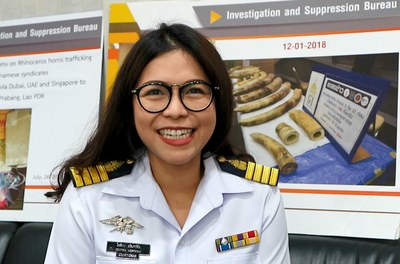Women Bring New Perspectives to Wildlife Law Enforcement in Thailand
In 2017, a seizure of illegal ivory from Kenya coupled with subsequent intelligence led Ms. Chotika Arintchai, a Senior Customs Inspector at Thai Customs, to believe that another ivory consignment was waiting to be smuggled into Thailand. She immediately alerted her contact at Kenya Customs, prompting a seizure of more than 60 pieces of ivory.
“[Kenya Customs] had no idea that there was ivory in that shipment,” she said. In the same year, Thai Customs confiscated 14 rhino horns from South Africa, worth over US$1 million, which prompted the investigation and arrest of a global criminal syndicate kingpin, Boonchai Bach.
Ms. Arintchai took the role of a counter wildlife trafficking (CWT) coordinator for Thailand’s international airports in 2013. Since then, she has seen the organization increasingly focus on wildlife crime cases and build its capacity to identify illegal shipments of wildlife products, seize contraband and make arrests. When she first started, the agency’s priority was only on seizing illegal exports and imports. The focus was on products rather than apprehending the criminals involved in smuggling illegal goods. Countering transnational organized crime was not a priority.
During coordination meetings with other law enforcement agencies, customs would often be criticized for failing to gather enough evidence for police to pursue cases which resulted in criminals being released. With support from her supervisor, Inspector Arintchai promoted the importance of follow-up investigations with her team and was the first to initiate the investigation of wildlife crime cases.
“It was also the time when Thailand enacted the Counter Transnational Criminal Organization Act. I felt we could not fall behind. We had to adjust the way we work to current issues,” she explained.
Over the last few years, Thai Customs has received technical support from several international organizations. This has included Ms. Arintchai participating in Counter-Transnational Organized Crime (CTOC) workshops in Lusaka, Zambia in 2017, and Brazzaville, Republic of the Congo in 2018; both were supported by the U.S. Agency for International Development (USAID) with co-funding funding from the U.S. Department of State’s Bureau of International Narcotics and Law Enforcement Affairs. Designed to help officers identify and disrupt transnational criminal syndicates involved in wildlife trafficking, CTOCs also place emphasis on bridging law enforcement responses in source countries in Africa with those in transit and destination countries in Southeast Asia and China.
“CTOCs were extremely helpful in increasing my African contacts. We rarely had opportunities to meet African counterparts,” said Inspector Arintchai. “The focus on investigative techniques also matched our need to create good investigators in Thai Customs. It instilled the mindset of going beyond seizures. The small things we capture are a part of a larger syndicate.”
She highlighted other skills learned during the CTOC courses which she now applies in her work as a Senior Customs Inspector. “I used techniques learned in acquiring evidence. I gathered and photographed everything, even small things like name cards,” she said. “We also learned about money laundering and have started referring drug cases to the Thai Anti-Money Laundering Office in the past few years.”
Today, Thai Customs is seen as an international agency and has gained global recognition. The team that arrested Boonchai Bach, including officers from Thai Customs, Royal Thai Police and Department of National Parks, Wildlife and Plant Conservation officers, earned the United Nations Environmental Protection Award in 2018. As a progressive law enforcement agency, Thai Customs is also enrolling more officers in training programs both internally and externally such as those organized by USAID Wildlife Asia.
Recognizing that law enforcement agencies are often more effective when there is an appropriate gender balance, USAID Wildlife Asia has been working with its counterparts in the region to encourage the participation of more women in training. Similarly, the USAID Wildlife Asia also actively promotes and engages women into its pool of trainers to assist with the delivery of capacity building programs. Inspector Arintchai is now part of this group, serving as a key resource person for training activities. “Women bring new skills and perspectives to the table. They are less likely to use excessive force and are skilled at using communication in ways that help defuse tension. Women are more likely to show sympathy and gain trust and collaboration from criminals. Also, women suspects may reveal more information to female officers. Their attention to detail helps facilitate a more thorough investigation and evidence acquisition,” said Inspector Arinthchai.
The airport investigation and suppression team employs more than 40 percent women with many in management positions, such as the head of the Suvarnabhumi Airport team. The Inspector believes that the empowerment of women depends on the leadership and policy of the organization.
“There are various types of criminals,” she said. “The authoritative approach typically performed by men works with some and the soft skills of women work with others. We just need to ensure we have both to do our job well.”


